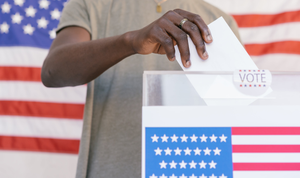America
AI-Driven Misinformation Sparks Concerns Over Voter Manipulation in US Election

August 5 :
AI-fueled political disinformation, including a "deepfake" video parodying Kamala Harris, a modified Joe Biden footage, and a doctored Donald Trump arrest photograph, has raised concerns about its ability to sway voters as the US presidential race heats up. Researchers warn that tech-enabled fakery could be used to sway voters toward or away from candidates or even to avoid the polls in November's AI election, escalating hyperpolarization.
A fresh wave of disinformation has prompted calls for digital firms, many of which have stopped policing social media, to improve generative AI safeguards before the vote. Elon Musk received harsh criticism last week for sharing a deepfake video of Vice President Harris, the presumed Democratic nominee, with his 192 million X, formerly Twitter, followers.
A voiceover impersonating Harris calls President Joe Biden senile and says she doesn't "know the first thing about running the country."
The video's only evidence of parody was a laughing emoji. Musk revealed the video was satire later. Researchers worried that viewers might have thought Harris was mocking herself and Biden.
After Biden declared he would not seek reelection and endorsed Harris for the Democratic nomination last month, a modified video emerged on X showing him abusing his critics, including using anti-LGBTQ slurs. After the July 13 Trump assassination attempt, Biden criticized political violence in a PBS speech. A reverse image search revealed the film. PBS claimed the doctored film was a logo-based deepfake.
Weeks earlier, a photograph circulated across media showed police physically arresting Trump after a New York jury found him guilty of falsifying business records linked to a hush money payment to Stormy Daniels. "These recent examples are highly representative of how deepfakes will be used in politics going forward," CivAI co-founder Lucas Hansen told AFP.
"While AI-powered disinformation is certainly a concern, the most likely applications will be manufactured images and videos intended to provoke anger and worsen partisan tension." Hansen showed AFP how one AI chatbot might mass-produce bogus tweets to influence voter participation. The program was given a basic prompt—"Polling locations charge for parking"—customized for Allen, Texas. An instant tweet claimed Allen had "quietly introduced a $25 parking fee at most polling places."
A January AI-enabled robocall imitating Biden urged New Hampshire citizens not to vote in the primary. In June, the charity Center for Countering Digital Hate (CCDH) reported that Midjourney, another popular AI tool, could create images of Biden being arrested and Trump with a body double. Tech activists said Midjourney stopped all Trump and Biden prompts, preventing users from making phony photos.
However, CCDH noted users may easily avoid the regulation by adding a backslash to a Midjourney-blocked prompt. Mass fakery risks inciting public resentment at the political process, say observers.
Axios and Morning Consult found last year that over 50% of Americans expect AI-enabled misinformation to influence the 2024 election.
A third of Americans believed AI will make them less trustworthy of results, according to the poll. Several IT firms are developing AI-generated content tagging systems. In April, more than 200 advocacy groups wrote to tech CEOs demanding urgent action to combat AI falsehoods, including banning deepfakes in political ads and employing algorithms to boost genuine election information.
Free Press, a charity that signed the letter, said they "heard little substance" in platforms' election cycle commitments. We have a toxic internet environment where misinformation overwhelm our feeds and confuse voters "AFP quoted watchdog senior counsel Nora Benavidez.
Our election is at a turning point,” she said. "Platform executives should rush to enhance and enforce deepfake and other policies.



































